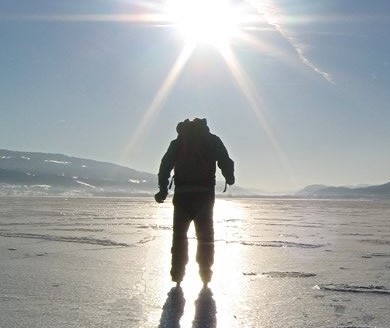
The Missionary was Shocked When I Walked on Water
The missionary challenged me to explain the miracles attributed to Jesus in the New Testament.
First, I questioned the validity of the New Testament stories. Then I explained that although Judaism believes in miracles, we do not rely on them as proof that someone is a prophet or the messiah.
A proof needs to be exclusive, and this is not the case with miracles since they can be attributed to magicians, charlatans, or false prophets who give a “sign or a wonder” as described in Deuteronomy 13:1-3.
You should have seen the missionary’s face when I told him I walked on water.
In January 1990, I visited the Soviet Union to teach Torah to Jews thirsting for knowledge. While visiting Leningrad, I detoured to see the Baltic sea, which was frozen over. As I ventured onto the ice and “walked on water,” I marveled that the ice could support my weight.
At that moment, I recalled this incident mentioned in this week’s Torah portion of Korach (Numbers 16:1–18:32).
Korach challenged the authority of Moses and caused others to join him. How was it possible for someone to dampen the awe and enthusiasm the Jews had for Moses?
An answer is found in Korach’s name because the same Hebrew letters (קרח) also spell the word for “kerach” which means ice. To challenge Moses’ leadership, Korach had to “cool down” the Jewish people by drawing attention to what he considered an unfair hierarchy. In the end, Korach’s rebellion failed, and it became clear that every individual plays a unique and valuable role in the community.
Millennium later, on a cold winter day, the holy Baal Shem Tov, founder of the Chassidic movement, traveled into the forest with his students. They came to a frozen lake and noticed two Russian peasants carving a cross into the ice to go fishing.
His students wondered what they should learn from witnessing a cross carved into the ice.
The Baal Shem Tov explained that the Torah is compared to water, which flows from a high place to a low place and gives life. However, if the Torah inside us is cold and indifferent, it can turn to ice, and all kinds of false theologies can be carved into it.
This happened in Korach’s time, in the time of the Baal Shem Tov, and is still happening today.
The solution is to warm up our Torah by practicing it with enthusiasm and imbuing it with spirituality which heightens sensitivity to God.
May this Shabbos provide you the opportunity to tap into the spiritual wellsprings of Judaism.
Shabbat Shalom,
Rabbi Bentzion Kravitz